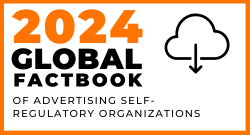The case for a sustainable global partnership between platforms and self-regulatory organizations
By Guy Parker, ICAS President and Chief Executive of the ASA UK –
Wherever advertisements appear we should all be able to trust them and the message they convey. At its best advertising informs, entertains, offers choice and helps drive both competition and the economy. It’s creative and engaging and can play an important societal role in promoting public safety messages, challenging harmful stereotypes and raising awareness about climate change.
All advertising standard bodies in ICAS membership, which includes the ASA in the UK, are working hard to promote legal, decent, honest and truthful advertising. We do that to make sure advertising works for everyone. Being part of ICAS, a global network committed to effective ad self-regulation, allows us to exchange best practice and work together on common solutions to the challenges faced by the advertising industry.
Our efforts play a vital role in driving trust in advertising and the ad industry as a whole.[1]
To maintain and increase people’s trust in advertising, we need to address the trust gaps. Independent global studies have shown that trust in advertising in online media, especially on social media, is lower than the trust in advertising on traditional media.[2] Studies also show an increase in public concern about intrusive advertising and the sheer number of ads, leaving people feeling bombarded.
To help address these issues and their scale, we at ICAS think it’s essential that the major global platforms work together with advertising standards bodies, if they are not already doing so, and become part of coalition seeking to rebuild trust in advertising. We think that will help to make platforms a safer and more trusted environment.
ICAS has created a ‘Framework for a Sustainable Global Partnership between Digital Platforms and Advertising Self-Regulatory Organizations’ encouraging platforms:
- to adopt a formal global policy recognising the role of national advertising standards bodies and committing to support their activities at national level;
- to join advertising standards bodies in ICAS and EASA membership, at the national level, and provide adequate and sustainable funding to them;
- to commit to collaborate with advertising standards bodies in terms of compliance, enforcement and improving internal platform-level advertising controls.
Collaboration between advertising standards bodies and major platforms is already working well in some countries, like the UK. In a major step last year Google also joined the European Advertising Standards Alliance as the first global digital company to support self-regulatory bodies across Europe. We applaud these collaborations.
However, we need to see this commitment in all countries where advertising standards bodies exist and which are committed to effective ad self-regulation, as enshrined in the ICAS Charter.
We are looking forward to a productive dialogue with all platforms which are funded by advertising at global and local level, to join forces to make advertising work better for everyone around the world.
[1] Recent post-campaign research undertaken in the UK has shown that awareness of the ASA is a powerful driver of trust in the ad industry. Those who saw/heard the ASA’s campaign proved two-thirds more likely to trust the ad industry than those who didn’t – and 50% more likely to trust most ads. https://www.asa.org.uk/news/it-s-about-trust-the-asa-ad-campaign-in-scotland.html
[2] “Social media ads are the least credible form of advertising worldwide, with just 25% of the global sample saying they trust these types of ads and nine out of the 17 markets sitting below this global average.” YouGov’s International Media Consumption Report, 2021.
See also the Kantar Dimension Study 2020 and GroupM Research Consumer Trust in Digital Marketing, 2020 which shows that “on average, two times more consumers say TV ads provide a more positive impression of brands than common digital formats”.

